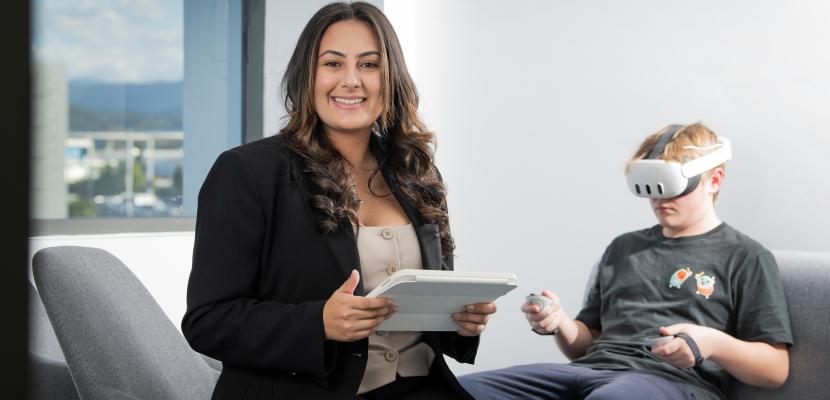
Virtual Reality is helping unlock the minds of neurodivergent children, enhancing their psychological therapy and social progress.
Bond University psychology students and academics are running a research trial using the power of VR in sessions to break the ice, stimulate open dialogue and help relax the children prior to treatment.
“We’re not using it (VR) as a mode of therapy; we’re using it to enhance therapy,” Associate Professor of Psychology Katarina Fritzon said.
So far, it’s having a positive impact.
“We use VR for roughly 10 to 15 minutes and then we get into the (psychological) session," Dr Fritzon said.
“It’s a good way to start by discussing with them how was that, what went on for you, was that scary when you jumped off the cliff in the game?” Master of Psychology (Clinical) student Sarah Ekdawi said.
“It gets the child to open up and talk about different emotions.”
A new report published in the scientific journal The Lancet Psychiatry found the mental health of young people has been declining globally over the past two decades, highlighting the need for early intervention and age-sensitive care.
The neurodivergent people in the Bond trial includes children with autism, ADHD, Tourette’s, dyslexia and other conditions.
“It's a new environment for the children, especially for kids with ASD (Autistic Spectrum Disorders).
“Everything's changing and they’re speaking to this complete stranger. It's really hard to build that trust,” Ms Ekdawi said.
Minecraft is the game of choice for the VR headsets, and with good reason – it’s the all-time best-selling video game with which most children are familiar.
This familiarity is important.
“For children, especially with autism, they like to talk about what they're interested in," Ms Ekdawi said.
“Their interests nowadays are technology and games, so the VR is helpful in trying to get into their world and speaking to them on their level.”
Five children are enrolled in the trial at Bond University’s Health and Wellness Clinic and Associate Professor Fritzon said she hoped the positive results of this trial would encourage more children to get involved.
“With the help of one of our researchers, who also runs a private practice, we hope that by the end of the year we’ll have 20 to 30 children enrolled in the trial,” she said.
“This will allow us to write it up as a pilot study and showcase what we learnt.”
Please visit Bond University Health and Wellness Clinic for more information.